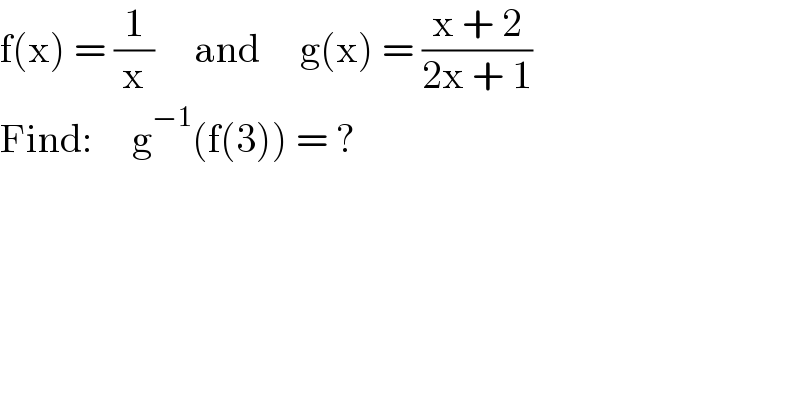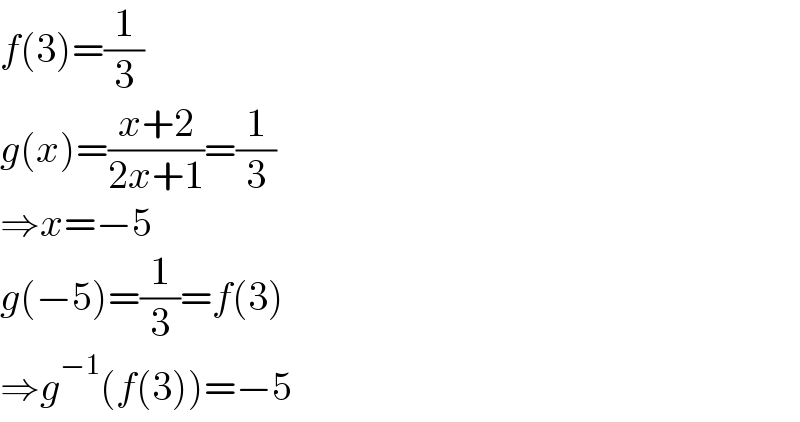
Question Number 179436 by Shrinava last updated on 29/Oct/22

$$\mathrm{f}\left(\mathrm{x}\right)\:=\:\frac{\mathrm{1}}{\mathrm{x}}\:\:\:\:\:\mathrm{and}\:\:\:\:\:\mathrm{g}\left(\mathrm{x}\right)\:=\:\frac{\mathrm{x}\:+\:\mathrm{2}}{\mathrm{2x}\:+\:\mathrm{1}} \\ $$$$\mathrm{Find}:\:\:\:\:\:\mathrm{g}^{−\mathrm{1}} \left(\mathrm{f}\left(\mathrm{3}\right)\right)\:=\:? \\ $$
Commented by cherokeesay last updated on 29/Oct/22
![y=((x+2)/(2x+1))⇔2xy+y=x+2⇒ x(2y−1)=2−y⇔x=((2−y)/(2y−1)) ⇔g^(−1) (x)=((2−x)/(2x−1)) g^(−1) [f(3)]=((2−(1/3))/(2×(1/3)−1))=−5](Q179446.png)
$${y}=\frac{{x}+\mathrm{2}}{\mathrm{2}{x}+\mathrm{1}}\Leftrightarrow\mathrm{2}{xy}+{y}={x}+\mathrm{2}\Rightarrow \\ $$$${x}\left(\mathrm{2}{y}−\mathrm{1}\right)=\mathrm{2}−{y}\Leftrightarrow{x}=\frac{\mathrm{2}−{y}}{\mathrm{2}{y}−\mathrm{1}} \\ $$$$\Leftrightarrow{g}^{−\mathrm{1}} \left({x}\right)=\frac{\mathrm{2}−{x}}{\mathrm{2}{x}−\mathrm{1}} \\ $$$$\:\:\:\:\:\:\:\:\:\:\:\:{g}^{−\mathrm{1}} \left[{f}\left(\mathrm{3}\right)\right]=\frac{\mathrm{2}−\frac{\mathrm{1}}{\mathrm{3}}}{\mathrm{2}×\frac{\mathrm{1}}{\mathrm{3}}−\mathrm{1}}=−\mathrm{5} \\ $$
Answered by ARUNG_Brandon_MBU last updated on 29/Oct/22

$$\mathrm{Let}\:\mathrm{y}=\frac{{x}+\mathrm{2}}{\mathrm{2}{x}+\mathrm{1}}\:\Rightarrow{x}=\frac{\mathrm{2}−\mathrm{y}}{\mathrm{2y}−\mathrm{1}}\:\Rightarrow{g}^{−\mathrm{1}} \left({x}\right)=\frac{\mathrm{2}−{x}}{\mathrm{2}{x}−\mathrm{1}} \\ $$$${f}\left(\mathrm{3}\right)=\frac{\mathrm{1}}{\mathrm{3}}\:\Rightarrow{g}^{−\mathrm{1}} \left({f}\left(\mathrm{3}\right)\right)={g}^{−\mathrm{1}} \left(\frac{\mathrm{1}}{\mathrm{3}}\right)=−\mathrm{5} \\ $$
Answered by mr W last updated on 29/Oct/22

$${f}\left(\mathrm{3}\right)=\frac{\mathrm{1}}{\mathrm{3}} \\ $$$${g}\left({x}\right)=\frac{{x}+\mathrm{2}}{\mathrm{2}{x}+\mathrm{1}}=\frac{\mathrm{1}}{\mathrm{3}} \\ $$$$\Rightarrow{x}=−\mathrm{5} \\ $$$${g}\left(−\mathrm{5}\right)=\frac{\mathrm{1}}{\mathrm{3}}={f}\left(\mathrm{3}\right) \\ $$$$\Rightarrow{g}^{−\mathrm{1}} \left({f}\left(\mathrm{3}\right)\right)=−\mathrm{5} \\ $$
Commented by Shrinava last updated on 29/Oct/22

$$\mathrm{thank}\:\mathrm{you}\:\mathrm{dear}\:\mathrm{professors} \\ $$
